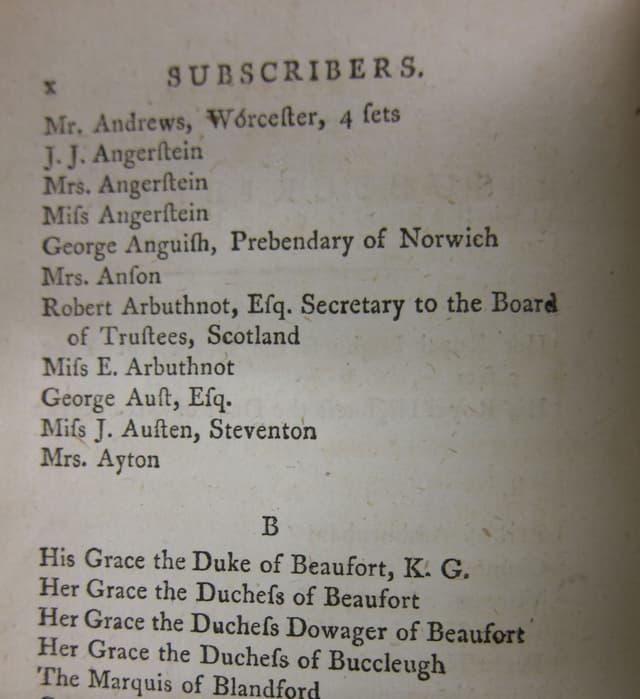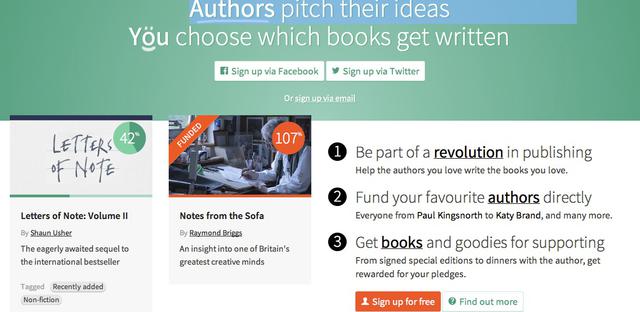Unbound: the reinvention of an idea that flourished 200 years ago
- Exhibited by
- Aline Reed
- Added
- March 31, 2015
- Medium of Communication
- Target Audience
- Type of Charity
- Country of Origin
- Date of first appearance
SOFII’s view
This great new publishing idea from Unbound is certainly a good example of crowd sourcing. But as page x of Camilla (see illustration) shows, it's not a new idea. It's a timely reinvention of a fundraising idea that flourished 200 years ago. Unbound is a commercial company and, maybe, the sponsors don't even see themselves as donors, but there is no doubt that this is a brilliant example of a very old idea being brought up to date through the sprinkling of a spell of technology. And sponsorship has always been a winner for charities.
Creator / originator
Unbound
Background
A little history
Jane Austen's name is thought to have appeared in print just twice during her lifetime and on neither occasion is she credited as an author. Her novels, including Pride and Prejudice, were published anonymously. Instead her name appears on a list of book sponsors as part of a scheme that has been reinvented today as Unbound.
Turn to page x of a first edition of Camilla by Fanny Burney and you will see a name you'll recognise, on the tenth row down, 'Miss J Austen, Steventon'.
At the age of 20, Jane Austen saw her name in print, not as an author but as a subscriber – a kind of book sponsor.
On the 7 July 1795, The Morning Chronicle included this announcement:
PROPOSALS for printing by Subscription a NEW WORK, in Four Volumes, 12 mo. By the AUTHOR of EVELINA and CECILIA: To be delivered on or before the 1st day of July, 1796. The Subscriptions will be 1 Guinea; to be paid at the time of subscribing.
Jane – or rather her father on her behalf – paid one guinea up front to help cover the cost of producing the novel. As such, she was supporting the publishing industry and getting something in return: a copy of the book and her name in lights (or rather listed with other benefactors at the front of the book).
Although Jane was forced to sell many of her possessions she always kept hold of the volume with her name, which shows the power of a good piece of donor recognition.
If you happen to have a copy of Shaun Usher's book Letters of Note, you might turn to page 363 where, sandwiched between a Mark Reading and Katie Reed, is my name. This will sadly be the one and only occasion where I can claim a similarity with Jane Austen as I too have been a book sponsor.
The present
Unbound was founded by three writers, Dan Kieran, Justin Pollard and John Mitchinson. They think that people who love books – primarily readers and writers – deserve a say in what does or doesn't get published.
Nowadays, even best selling authors are beginning to have very restrictive parameters imposed on the kinds of books they get to write. Put simply, there are lots of potentially great books we're not getting the opportunity to read.
Unbound thinks we need a new way to publish books.
Special characteristics
It's interesting that the scheme works in almost exactly the same way as in Jane Austen's day, only with a little technological magic to speed up the process.
Unbound allows anyone to be a book sponsor and the level of contribution depends on what kind of reward and recognition someone wants to receive.
After that, sponsors can visit the website, receive an email, or tweet when there's another book they might want to support. And, of course, sponsoring a book also makes a great present.
It is interesting that the careers of Jane Austen and Charles Dickens started through sponsorship. Through this scheme, their successors might be discovered.
Merits
With this example, we've left 'traditional' charities behind. I don't know whether participants of Unbound see themselves as donors, but it's clear that the scheme contains all the ingredients of good fundraising – tangible need, a target, donor reward, donor recognition and the chance to support again.
Additional info about Unbound
 View original image
View original image
 View original image
View original image
 View original image
View original image
Also in Categories
-
- Individual donors
- Publications
















